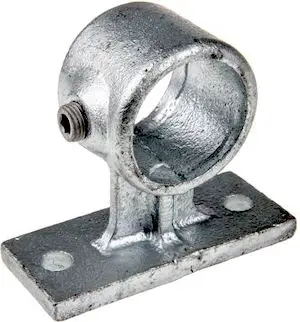A complete certainty.
Lead-pipe cinch
What's the meaning of the phrase 'Lead-pipe cinch'?
What's the origin of the phrase 'Lead-pipe cinch'?
The ‘cinch’ that this expression derives from is the Spanish/Mexican word for a horse’s saddle-girth – cincha. These were typically made from twisted strands of horsehair and provided a secure fixing for the saddle. The word is recorded in English, as ‘synch’ and later ‘cinch’ in various Canadian and US sources from the 1860s onward.
From the 1880s the use was extended into a verb form and things which were tightly secured were said to be ‘cinched’; for example, this piece from The Manitoba Daily Free Press, December 1882:
“The next movement was to throw the bull, and then cinch a lasso and rope tightly around his body.”
The word cinch was also used in the USA as the name of sturdy fixing brackets, which were secure and unlikely to come loose.
The figurative use of cinch, meaning to tie-up or make certain, in non-animal contexts began around the same time. The usage was often in contexts where the rich and powerful used their status to form monopolies or indulge in insider trading in order to cheat the general public. An example of this comes from the Illinois newspaper The Morning Review, December 1889, which is the earliest citation of ‘lead-pipe cinch’ that I’ve found:
“The briber and bribed would sit down to a game of poker and a “lead-pipe cinch” was nothing to the sure thing the legislators had.”
The common usage of ‘cinch’ now, that is, to mean ‘easy’ rather than ‘secure’, comes from this ‘easy money’ association.
The ‘cinch’ part of the phrase is fairly straightforward, but what about ‘lead-pipe’. On the face of it there doesn’t seem to be anything especially secure or easy about lead pipes. Some have suggested that lead pipes were used to twist and tighten cinch straps. That seems difficult to understand, as virtually any nearby piece of wood could have been used just as well.
Another explanation is that a cinch was a form of joint used in plumbing and that a lead-pipe cinch was a secure joint.
Others have suggested the derivation lies with some property of lead pipe, for example, it is easy to bend, or it constituted an effective weapon with the certainty of knocking someone out. There’s no evidence to support any of the above suggestions.
The ‘secure fixing’ bracket seems the most plausible source. However, it may be that there’s no particular reason that ‘lead-pipe’ was chosen as an intensifier for cinch, other than it trips nicely off the tongue.
In support of that view there are examples of other intensifiers for cinch, which would hardly be likely if ‘lead-pipe’ had a special meaning. In 1891, Maitland’s Slang Dictionary refers to ‘leadpipe’ and ‘grapevine’ as superlatives for cinch. In October the same year The Daily Morning Republican, listed a number of ‘cinch’ superlatives to describe a punter’s certainty that his horse Firenzo would win the next day:
“The track will be heavy tomorrow, and I’ve got a copper riveted, lead pipe, copyrighted, air tight cinch. Firenzo in the mud – she swims in it.”
The history of “Lead – pipe cinch” in printed materials
Trend of lead – pipe cinch in printed material over time
Related phrases and meanings
Browse more Phrases
About the Author

Phrases & Meanings
A-Z
A B C D E F G H I J K L M N O P Q R S T UV W XYZ
Categories
American Animals Australian Bible Body Colour Conflict Death Devil Dogs Emotions Euphemism Family Fashion Food French Horses ‘Jack’ Luck Money Military Music Names Nature Nautical Numbers Politics Religion Shakespeare Stupidity Entertainment Weather Women Work
How did we do?
Have you spotted something that needs updated on this page? We review all feedback we receive to ensure that we provide the most accurate and up to date information on phrases.
